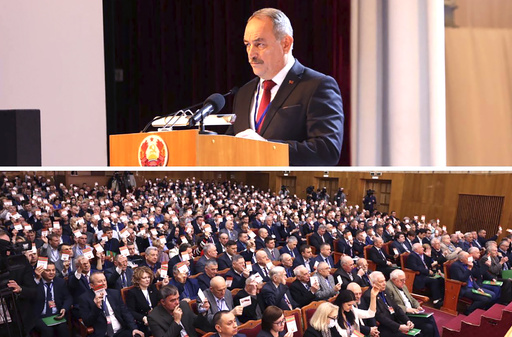CHISINAU, Moldova (AP) — Officials in Moldova’s Russia-backed breakaway region of Transnistria appealed to Moscow for protection Wednesday, as tensions escalate with the pro-Western government.
Moldova, a candidate to join the European Union, imposed new customs duties on Jan. 1, 2024 on imports to and exports from Transnistria, which borders Ukraine and isn’t recognized by any U.N. member countries, including Russia, which maintains close ties to the region.
On Wednesday, members of the Transnistrian congress used a rare meeting in the regional capital, Tiraspol, to ask the Russian Duma to “implement measures for defending Transnistria amid increasing pressure from Moldova, given the fact that more than 220,000 Russian citizens reside in Transnistria.”
A short war in the early 1990s led pro-Russia forces in Transnistria to declare a breakaway state. To this day, Russia stations about 1,500 troops in the region as so-called peacekeepers, who guard huge Soviet-era weapons and ammunition stockpiles.
Moldova is working to align its economic legislation with the EU as it pursues full membership in the 27-nation bloc. But the new customs duties leveled on Transnistria have angered officials there, who say the measures harm local residents and businesses.
In a declaration read out on Wednesday, officials in Tiraspol also appealed to the European Parliament to prevent what it described as pressure from Moldova from “violating the rights and freedoms” of local residents. They made similar appeals to the U.N. secretary-general, the European Parliament and the International Committee of the Red Cross.
Before Wednesday’s meeting, tensions mounted after an opposition legislator in Tiraspol last week said the gathering could be used to announce a bid by Transnistria to join Russia.
A spokesperson for Moldova’s government dismissed those claims and labeled the meeting a “propaganda event,” adding that there was “no danger of escalation.”
Alexander Korshunov, chairman of the Transnistrian Supreme Council, said Wednesday that Moldova was “taking advantage of the geopolitical situation” and using the economy “as a tool of pressure and blackmail.”
He added: “Moldova’s policy and goals regarding Transnistria have remained unchanged over the past decades: to destroy our economic potential, create unbearable living conditions for our citizens … and achieve the dismantling of our statehood.”
Russian Foreign Ministry spokesperson Maria Zakharova also commented on those annexation speculations on Wednesday.
“For several days now, people in Chisinau have been speculating and wondering what decisions this forum might make,” she said. “Well, apparently, the same panic gripped NATO.”
In a 2006 referendum in Transnistria, more than 95% of voters backed the option of joining Russia, but the ballot wasn’t internationally recognized. The U.S. State Department at the time called it a “provocative referendum” that “cannot be taken seriously.”
Moldova was granted EU candidate status in 2022. It was further buoyed in December last year when Brussels said it would open accession negotiations, alongside neighboring Ukraine.
Transnistria, which has a population of about 470,000, is a thin strip of territory located between the eastern bank of the Dniester River and Moldova’s border with Ukraine. The unrecognized state, officially named the Pridnestrovian Moldavian Republic, has its own currency and flag.
Since Russia launched a full-scale invasion of Ukraine on Feb. 24, 2022, Moldova’s pro-Western leaders have routinely accused Moscow of conducting campaigns to try to destabilize the country, which was a Soviet republic until 1991.
___
Stephen McGrath reported from London. Dasha Litvinova contributed to this report from Tallinn, Estonia.
___
This story has been corrected to show that the 2006 referendum was held in Transnistria, not in Moldova as a whole.
This website uses cookies so that we can provide you with the best user experience possible. Cookie information is stored in your browser and performs functions such as recognising you when you return to our website and helping our team to understand which sections of the website you find most interesting and useful.
